[Dec 2007, Volume 4 Quarterly Issue] Pdf File size - The IIPM Think ...
[Dec 2007, Volume 4 Quarterly Issue] Pdf File size - The IIPM Think ...
[Dec 2007, Volume 4 Quarterly Issue] Pdf File size - The IIPM Think ...
Create successful ePaper yourself
Turn your PDF publications into a flip-book with our unique Google optimized e-Paper software.
A NEW BEGINNING<br />
Brief for Petitioners 2, 8-9. Now, respondent<br />
seeks to enforce its patent<br />
rights against the petitioners based on<br />
their alleged violation of “conditions”<br />
placed on the original agreement with<br />
Intel. <strong>The</strong> first sale doctrine was designed<br />
to prohibit precisely this type of<br />
reach-through by the patent owner to<br />
enforce its patent rights. Under this<br />
Court’s precedents, once the petitioners<br />
purchased products embodying essential<br />
features of the patented invention<br />
in an authorized sale, respondent’s<br />
patent rights were exhausted. If the<br />
conditions placed in the license with<br />
Intel are consistent with contract law,<br />
antitrust law, and the patent misuse<br />
doctrine, then any violations can be enforced<br />
against Intel as contract claims<br />
(or possibly against the petitioners as<br />
third party contract claims), rather than<br />
patent infringement claims with the attendant<br />
remedies of injunctive relief,<br />
treble damages, and attorneys’ fees.<br />
Such a result is consistent with the need<br />
for certainty and competitiveness of not<br />
only this market transaction, but also<br />
the wide ranges of market transactions<br />
that rest on intellectual property. In<br />
eBay Inc. v. Mercexchange, L.L.C., 126<br />
S.Ct. 1837 (2006), a plurality of the<br />
Court was concerned about the development<br />
of an industry “in which firms<br />
use patents not as a basis for producing<br />
and selling goods but, instead, primarily<br />
for obtaining licensing fees”, and the<br />
potentially harmful effects of injunctive<br />
relief “[w]hen the patented invention is<br />
but a small component of the product<br />
the companies seek to produce….” Id.<br />
at 1842 (Kennedy, J., concurring). <strong>The</strong><br />
In future cases, Indian High Courts could look to procompetition<br />
decisions in the United States, such as eBay<br />
and perhaps Quanta, to recognize that the need for competition<br />
balances the need for intellectual property rights<br />
first sale doctrine plays a role in preventing<br />
similar market disruption, as<br />
here, when a non-manufacturing patentee<br />
seeks to control the manufacture of<br />
end products in which the patented item<br />
is but a small component.<br />
<strong>The</strong> United States Supreme Court’s<br />
resolution of the Quanta case has implications<br />
globally. By abrogating the<br />
conditional sale doctrine, the Court will<br />
be affirming the bedrock principle of<br />
the first sale doctrine. More importantly,<br />
it will be recognizing competitive<br />
values in intellectual property law.<br />
Such a result is imperative for countries<br />
like India that are reforming intellectual<br />
property law and institutions. As<br />
the recent dispute brought by Novartis<br />
over the patentability of Gleevak shows,<br />
intellectual property norms are still being<br />
debated locally. <strong>The</strong> Quanta case<br />
shows that these norms are global. If<br />
the first sale doctrine is affirmed, then<br />
competition becomes an important normative<br />
goal for the design of intellectual<br />
property systems. India will have<br />
a strong position in asserting the values<br />
of competition as a limit on patent and<br />
other intellectual property rights.<br />
More subtly, if the Supreme Court<br />
strikes down the conditional sale doctrine,<br />
the Court will be placing some<br />
limits on the power of the Federal Circuit,<br />
the specialized patent appellate<br />
court in the United States. <strong>The</strong> Court<br />
will be implicitly saying that despite its<br />
expertise in patent law, the Federal Circuit<br />
cannot alter through the creation<br />
of new rules, like the conditional sale<br />
doctrine, that counter established principles<br />
of competition law and policy,<br />
like the first sale doctrine. In the Novartis<br />
dispute, the High Court of Chennai<br />
deferred to the Indian patent office<br />
and left open the standard for innovation<br />
in the pharmaceutical industry. In<br />
future cases, Indian High Courts could<br />
look to pro-competition decisions in the<br />
United States, such as eBay and perhaps<br />
Quanta, to recognize that the need for<br />
competition balances the need for intellectual<br />
property rights. As discussion<br />
in this essay suggests, intellectual property<br />
rights and competition together are<br />
both important for innovation.<br />
In conclusion, a business dispute over<br />
a patent license is the basis for the dispute<br />
in Quanta. But at stake is a bedrock<br />
principle of law, the first sale doctrine,<br />
and the relationship between<br />
competition norms and intellectual<br />
property law. <strong>The</strong> Supreme Court’s<br />
decision in the case should be closely<br />
watched for what it implies for international<br />
intellectual property law.<br />
170 THE <strong>IIPM</strong> THINK TANK


![[Dec 2007, Volume 4 Quarterly Issue] Pdf File size - The IIPM Think ...](https://img.yumpu.com/29766298/169/500x640/dec-2007-volume-4-quarterly-issue-pdf-file-size-the-iipm-think-.jpg)
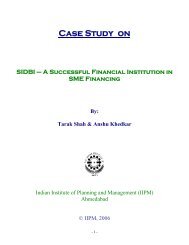
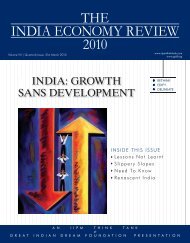
![[Feb 2008, Volume V Annual Issue] Pdf File size - The IIPM Think Tank](https://img.yumpu.com/43961117/1/190x245/feb-2008-volume-v-annual-issue-pdf-file-size-the-iipm-think-tank.jpg?quality=85)
![[June 2008, Volume V Quarterly Issue] Pdf File size - The IIPM Think ...](https://img.yumpu.com/41693247/1/190x245/june-2008-volume-v-quarterly-issue-pdf-file-size-the-iipm-think-.jpg?quality=85)
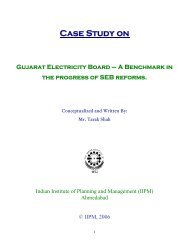
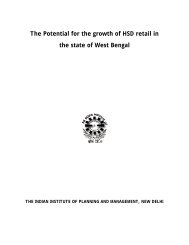
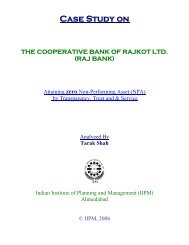

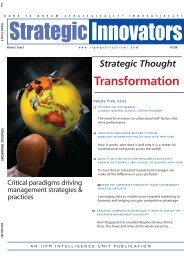
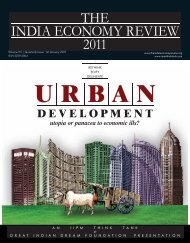
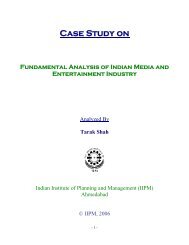
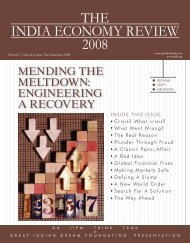
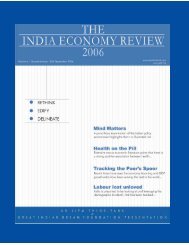
![[Volume VI | Quarterly Issue: 31st May 2009] Pdf File size](https://img.yumpu.com/27796051/1/190x245/volume-vi-quarterly-issue-31st-may-2009-pdf-file-size.jpg?quality=85)